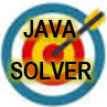OpenRules RuleSolver is an open source tool that adds the power of Constraint and Linear Programming to Business Decision Modeling. A newly introduced decision tables allow business users to express complex optimization problems using intuitive decision tables. It integrates Rule Engines and Constraint/Linear Solvers to support declarative Decision Modeling. You may find many examples here. The underlying implementation is based on JSR-331. Link
-
Join 15 other subscribers
-
Recent Posts
Archives
Blogroll
Conferences
Contact Info
jacobfeldman@openrules.comMeta
Categories



 I finally found time to mavenize JSR-331 and JavaSolver and make them publicly available through commonly used MVN and GitHub repositories. The latest Release 2.0.1 of April 2020 comes with the following news:
I finally found time to mavenize JSR-331 and JavaSolver and make them publicly available through commonly used MVN and GitHub repositories. The latest Release 2.0.1 of April 2020 comes with the following news: